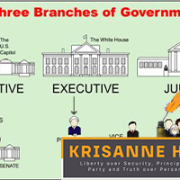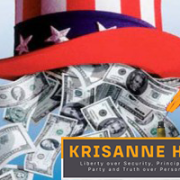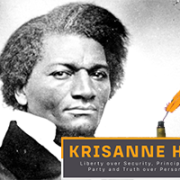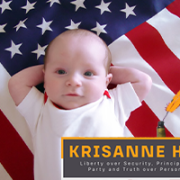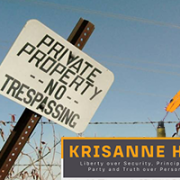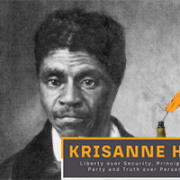Stolen Education, Stolen Children, Stolen Future
Stolen Education, Stolen Children, Stolen Future
by KrisAnne Hall. JD
This is an informational presentation I gave at a rally in Ft. Walton Beach, FL. Much of this information can be found in Charlotte Iserbyt’s book The Deliberate Dumbing Down of America. As shocking as it may be, it is all factual and verifiable. Please educate yourself on this vital issue.
As we are consumed by the media frenzy over every new crisis, we must understand the real problem and therefore obtain the real solution. If we are to restore America, we must recognize what has brought us to where we are today. We cannot overcome the enemies if we do not know who they are. One of the greatest contributors to America’s march toward Marxism is the brainwashing of generations of America’s children. America’s children have been kidnapped by the enemies of American Liberty. Our educational system has become concentration camps of brainwashing and Marxist programming.
If we are to correct this menace, we must know the people and principles upon which our educational system has been built since the 1800’s.
- · Wilhelm Wundt in 1832 was the founder of Experimental Psychology and the Force behind its dissemination throughout the western world. His foundational theory became the basis for teacher training for over 150 years: he taught that children were nothing more than a stimulus response mechanism – nothing more than animated meat made up of neurons and electrochemical reactions.
- · Edward Lee Thorndike, in 1903 was a professor of education and writer of 507 books on the methods of teaching which helps form the basis of teacher training and philosophy today. He said that children could be equated to “rats, monkeys, fish, cats, and chickens” animals that simply needed to be programmed.
- · John Dewey, heralded as the father of modern education, is actually the father of progressive education. He wrote the book Psychology, the most widely-read and quoted textbook used in schools for teachers in this country. Dewey taught that the primary commitment to literacy was the greatest problem that the American school system faced. Look at some of the quotes from this father of modern education and one of the signers of The Humanist Manifesto:
“The plea for the predominance of learning to read in early education seems to me a perversion.”
“Undue premium is put upon the ability to read at a certain chronological age…the entertainment plus information motive for reading conduces the habit of solitary self-entertainment”
“we violate the child’s nature and render difficult the best ethical results, by introducing the child too abruptly to a number of special studies, of reading, writing, geography. The true center of correlation on the school subjects is not science, nor literature, nor history, nor geography, but the child’s own social activities”
“The mere absorption of facts and truth is so exclusively an individual affair that it tends very naturally to pass into selfishness. There is no obvious social motive for the acquirement of learning; there is no social gain therein.”
- · G. Stanley Hall(1844-1924) John Dewey’s professor – taught that it was better to be illiterate – “the knowledge which illiterates acquire is probably a much larger proportion of it practical. Moreover, they escape much eye strain and mental excitement and other things being equal are probably more active and less sedentary”…“Illiterates escape certain temptations, such as vacuous and vicious reading. Perhaps, we are prone to put too high value both upon the ability to read and the discipline involved in doing so.”
No surprise we graduate our high school seniors at a 50% illiteracy rate, having this as the very foundation of America’s educational system.
What about the actions of our own government?
The General Education Board was incorporated by congress in 1902; endowed by John D. Rockerfeller, Sr. The purpose was to set up an educational laboratory to experiment with the very educational system Wundt, Thorndike and Dewey proposed. The Director of this congressionally-established organization, Frederick Gates said, “In our dream, we have limitless resources, and the people yield themselves with perfect docility to our molding hands. The present educational conventions fade from our minds; and, unhampered by tradition, we work our own good will upon a grateful and responsive folk.”
The 1917 Congressional Record of the US Senate published this statement:
“The General Education Board was authorized to do almost every conceivable thing which is anywise related to education, from opening a kitchen to establishing a university, and its power to connect itself with the work of every sort of educational plant or enterprise conceivable will be especially observed.”
In 1918, in an issue of New York World, William Boyce Thompson, Federal Reserve Bank Director and founding member of the Council on Foreign relations made the following observation:
“Russia is pointing the way to great and sweeping world changes. When I sat and watched those democratic conclaves in Russia, I felt I would welcome a similar scene in the United States.”
Dr. Augustus Thomas, Commissioner of Education for the State of Maine stated to a conference of world educators in 1927, “If there are those who think we are to jump immediately into a new world order, actuated by complete understanding and brotherly love, they are doomed to disappointment. If we are ever to approach that time, it will be after patient and persistent effort of long duration.”
John Eugene Harley, Law Professor at Harvard published a book called International Understanding in 1931 and made this statement: “And the builder of this new world must be education. Education alone can lay the foundation on which the building is to rest. Plainly the first step in the case of each country is to train an elite to think, feel, and act internationally.”
President Herbert Hoover in 1932 appoints a research committee on recent social trends, not approved or funded by Congress, but an Executive action underwritten by the Rockefeller Foundation. No report was ever made to Congress or to the people. It assembled the largest community of social scientist ever assembled to assess the social condition of the nation.
NEA federally chartered in 1906, created the Educational Policies Commission in 1932 and published a document titled Education for all Youth with the following goals for solving problems in the educational system and working toward the new progressive education:
- · Federal programs for health, education, and welfare combined into one bureau
- · Head start programs
- · Getting preschool children into the system
- · Youth services through a poverty program
- · Removal of local control of political and educational matters “without seeming to do so”
- · Sex education
In 1942 the American Federation of Teachers published a book titled America, Russia and The Communist Party in the Postwar World “If this war is to be followed by a just and lasting peace, America and Russia must find a way to get along together…the UN, including America and Russia, is the only agency that can establish such peace.” The UN Charter becomes effective on October 24, 1945 with the US Chamber of Commerce as a prime mover in establishing the UN. United Nations Educational, Scientific and Cultural Organization(UNESCO) and its mandate for international intellectual co-operation had already been working under a League of Nations resolution on 21 September 1921.
Right in line with the General Education Board, Thompson, Thomas, and Harley, in 1958 Eisenhower signed the first set of agreements with the Soviet Union, which included an education agreement. Agreements just like this have been signed by every single president since Eisenhower.
George Bush, Sr. has stated time and time again, “we have an unprecedented opportunity to build a new world order.”
The concerted effort on every front continues to make our children believe they are global citizens. On May 2011 Superman relinquished his US citizenship. In the 900th Issue, Superman says, “I intend to speak before the United Nations tomorrow and inform them I am renouncing my US Citizenship”.
In our recent years we have lived with No Child Left Behind, Race to the Top, and Common Core. It seems as if these programs are getting progressively worse, but in reality they are simply becoming progressively closer and closer to the orgininal design. Strangely enough, this design is disclosed in the documents of these programs. For example, Rase to the Top’s established and printed purpose, as stated in national education directives is to transfer loyalty from the family to the government. The teacher manuals state that we are to be teaching Constructivism where “students construct [their own] understanding of reality, and [realize] that objective reality is not knowable” (p.10)
Our children have been manipulated by a pernicious design since before the mid 1800s. Our elected representatives on the state and local level have the ability to restore education according to the intent of the founding of this nation and the will of the people.
What is that going to take? We as parents, grandparents must say our children are NOT animals.
Our children are NOT fodder for experimentation. Our children are OUR CHILDREN and will not be manipulated to love government more than us.
Our children are the future of this great nation and we will NOT surrender our future to ideals and programming that is Anti-American, Anti-God, and Anti-morality.
We should NOT surrender our Children. We need to take back our children, take back their education, and WE TAKE BACK the future of America.
This monster will not be changed overnight – during the decade or more it will take us to regain control of the system, our children will still be being brainwashed. I believe we must get our children out, until we can reclaim the government education industry and return it to the people. Now knowing the globalist objectives, I believe We MUST no longer participate in government manipulated education. We MUST make the sacrifice worthy of our founders and say, my child/ grandchild is MY responsibility, and I will teach them according to the values and Ideals we hold dear. We MUST utilize private and homeschooling options, we must form community alliances and homeschooling cooperatives; I believe we must use private citizens and private donors to build a new system of education that belongs to the local communities. We must set about separating ourselves from this system of indoctrination before it’s too late.
We are either serious or we are not. Our future is at stake or it’s not. Our voting will be all in vain unless we raise up a new generation of patriots. WE MUST RESCUE OUR CHILDREN.
Don’t forget, a full educational course designed to teach you about the pernicious design of this progressive education system is available today at www.LibertyFirstUniversity.com

